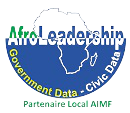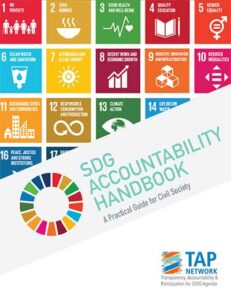About the Handbook
The SDG Accountability Handbook: A Practical Guide for Civil Society is a capacity development resource that seeks to support national-level civil society hold their government accountable for 2030 Agenda promises, better understand specific approaches to hold governments accountable for the SDGs, and guide them through the practical steps they can take to improve accountability for the 2030 Agenda in their country. It features a variety of distinct approaches civil society can use to monitor and follow-up on SDG implementation, as well as country-specific case studies and ky resources and tips.
Special Message from Amina Mohammed
Read the SDG Accountability Handbook Special Message from United Nations Deputy Secretary-General Amina Mohammed.
Foreword from the TAP Network
Civil society has an important role to play in helping to deliver and ensure government accountability for the SDGs. We hope that this Handbook will enable civil society to pursue accountability for the SDGs in an informed, efficient and effective manner.
Introduction and Background
The 2030 Agenda is a global 15-year plan of action to end poverty, protect the planet and ensure prosperity for all, while strengthening universal peace in larger freedom.
Authors & Acknowledgements
The SDG Accountability Handbook is supported by guidance from experts, organizations, TAP Network Members, and TAP Network Partners.
What is the purpose of the Handbook?
SDG Accountability Handbook: A Practical Guide for Civil Society seeks to support national-level civil society to help them hold their government accountable for commitments made in the 2030 Agenda for Sustainable Development (the 2030 Agenda), including the Sustainable Development Goals (SDGs). It aims to help civil society organizations (CSOs) better understand specific approaches to hold governments accountable for the SDGs, and to guide them through the practical steps they can take to improve accountability for the 2030 Agenda in their country.
Who is the Handbook for?
The Handbook is intended for use primarily by national or local level CSOs, although it may also be used by a range of other actors seeking to promote accountability for the 2030 Agenda. For the purposes of the Handbook, CSOs include non-governmental organizations (NGOs), community-based organizations or groups, faith-based organizations, trade unions and professional associations, and civil society coalitions, networks and social movements.
What is the focus of the Handbook?
The Handbook focuses mainly on vertical accountability for the SDGs – i.e. the relationship between the State and its citizens – given that the primary responsibility to implement the 2030 Agenda rests with national governments. Approaches for the accountability of the private sector and civil society, as well as regional, international, thematic and other opportunities for SDG accountability are also highlighted in the Handbook.
The Handbook focuses on promoting effective CSO engagement with relevant actors, institutions, processes and mechanisms mainly at a national or local level, seeking to balance formal (i.e. well-established or government-led processes) with informal approaches to improve accountability for the SDGs. As there is no universal or one-size-fits-all approach to achieving accountability for the 2030 Agenda, the Handbook seeks to provide general guidance to national and local CSOs that will need to be adapted to different national, local and cultural contexts. As there are many existing resources on social accountability, this Handbook looks to complement those resources, contextualizing approaches for addressing accountability for the 2030 Agenda and the SDGs.
Recognizing the complexity around social accountability, the SDG Accountability Handbook is not an exhaustive approach to SDG accountability – rather it aims to highlight the main approaches that can be used by CSOs to hold their government accountable for 2030 Agenda commitments. The Handbook also does not fully address mutual accountability between States, nor should it be seen as a treatise or thesis on social accountability more broadly.
How can I use the Handbook?
Each section or approach in the Handbook has been written in a way that allows it to stand independently from the rest of the Handbook. Cross-references to other sections, where applicable, have been provided. It is important to emphasize that the Handbook is not a stand-alone or static guide. Where possible, references to supplementary material and websites have been provided to ensure that users have access to the most current information. To this end, the SDG Accountability Handbook will feature regular revisions to both the print and online versions, and we would encourage colleagues to contribute inputs to feature in the Handbook on a rolling basis.
Finally, although the Handbook outlines approaches that can be pursued separately, approaches will often be more effective if utilized in combination with other approaches. Governments may not respond to only one type of approach or pressure, and multiple approaches often have a greater chance of success. Accordingly, achieving accountability for the 2030 Agenda will likely require using a number of different tactics and strategies to ensure that governments keep their promise to work tirelessly to implement the SDGs and to ensure that no one is left behind. As national contexts and political environments vary tremendously, it will be important for users of this Handbook to determine which approaches to accountability would work best to hold their own national governments accountable.


